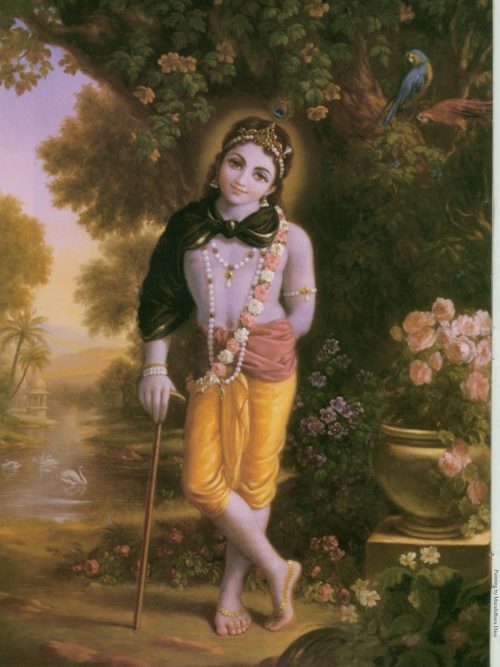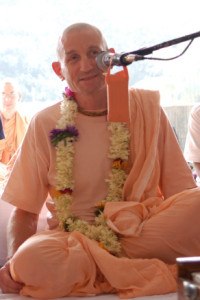Hare Krishna
23rd October, 2015. Gurgaon

Yesterday morning I heard a beautiful lecture by HG Jananivas Prabhuji which Prabhuji gave at Mayapur. As usual it was a lecture filled with many gems. Prabhuji is a very exalted and pure devotee of Krishna, it was my good fortune that I was able to hear his lecture. Two topics in his lecture touched my heart
a) supremacy of Bhakti over all other yoga processes.
b) importance of Guru and initiation in our life.
I will write about the first part today, where Prabhuji spoke about the power of bhakti over all other processes. We may have heard all this before and know it but the way Prabhuji gave the essence was remarkable.
The particular verse on this day was from the sixth canto of Srimad Bhagavatam where the story of ‘Citraketu’ is continuing. Here is the verse:
O King Parīkṣit, after only one week of repeatedly practicing the mantra received from the spiritual master, Citraketu achieved the rule of the planet of the Vidyādharas as an intermediate product of his spiritual advancement in knowledge. (SB 6.16.28)
After first giving the listeners a brief background about the chapter, glorifying ‘Citraketu’ and then expanding this particular pastime, Prabhuji explained that, similar to ‘Citraketu’, sometimes devotees do not directly go back to Godhead but they have to take a birth. (‘Citraketu’ finally took birth as ‘Vritasura’ and then went back to Godhead).
Jananivas Prabhuji then quoted Srila Prabhupada who said:
‘If you still have a mood of enjoyment in Krishna consciousness, you are performing devotional service but you have the mood of enjoyment then your next birth will be in the heavenly planets. you will have to work out that enjoyment and after that you can go back to Godhead.’
Prabhuji reiterated that devotees are not expected to maintain the mood of enjoyment, especially at the last of our life, when we are leaving the body very rapidly, we should wind everything up completely and take shelter of the Lord, then we go back to Godhead.
Prabhuji then read the below short but devotionally pregnant purport by Srila Prabhupada:
‘If a devotee, after being initiated, adheres rigidly to the instructions of the spiritual master, he is naturally endowed with the material opulences of vidyādhara-adhipatyam and similar posts as by-products. A devotee need not practice yoga, karma or jñāna to achieve a successful result. Devotional service alone is competent to award a devotee all material power. A pure devotee, however, is never attached to material power, although he gets it very easily without personal endeavor. Citraketu received this side benefit of his devotional service, which he rigidly performed in accordance with the instructions of Nārada. A devotee need not practice yoga, karma or jñāna to achieve a successful result. Devotional service alone is competent to award a devotee all material power‘.
Jananivas Prabhuji explained how Citraketu received this power simply as a side benefit of devotional service. Not that he was interested but somehow or other he was given that position so he could still enjoy as a side product of his devotional service. But his consciousness was more fixed on his devotional service rather than the side product of being the king of ‘Vidyādharas’. He acted like a king, it seemed like he was enjoying but his consciousness was fixed on his worshipable Lord and his devotional service.
So a devotee doesn’t have to worry about Karma, jnana or yoga to achieve successful results, devotional service alone is powerful enough to do it. This is the position of devotional service, the position of bhakti. Bhakti is independent. Whereas in karma, jnana and yoga, to get their perfection, one needs some bhakti yoga but for bhakti yoga we don’t need karma, we don’t need jnana, its independent.
For Karmis (materialists)
Prabhuji stated ‘just like the Karmis, they want sense gratification. They are religious, they are pious, they are practicing karma yoga but they want happiness in the material world. So what does Krishna says about about karma yogi –
yat karoṣi yad aśnāsi yaj juhoṣi dadāsi yat
yat tapasyasi kaunteya tat kuruṣva mad-arpaṇam (BG 9.27)
Whatever you do, whatever you eat, whatever you offer or give away, and whatever austerities you perform — do that, O son of Kuntī, as an offering to Me.
In other words do everything for Krishna. Karma yoga culminates in bhakti yoga. When we do this, do everything for Krishna, then it becomes bhakti, our karma becomes bhakti.
For jnanis (knowledge seekers)
For jnanis, Krishna says:
bahūnāṁ janmanām ante jñānavān māṁ prapadyate
vāsudevaḥ sarvam iti sa mahātmā su-durlabhaḥ (BG 7.19)
After many births and deaths, he who is actually in knowledge surrenders unto Me, knowing Me to be the cause of all causes and all that is. Such a great soul is very rare.
So conclusion of jnana is that after thousands of births one surrenders to Krishna. In reference to this verse Srila Prabhupada said:
‘This is Krishna’s statement, after thousands of births one comes to the platform of ‘ vāsudevaḥ sarvam iti’, Krishna is the supreme personality of Godhead. I’m telling you now that Krishna is the supreme personality of Godhead, you surrender to Krishna now. You hear me, and you do that (surrender to Krishna), you skip those thousands and thousands of births because you come to the conclusion of thousands and thousands of births!
So culmination of jnana is bhakti – surrender to Krishna.
So one get the perfection of jnana when it is dovetailed or used for understanding bhakti.
For yogis
Now to the ashtanga yogis, and all the other yogis, Krishna say:
yoginām api sarveṣāṁ mad-gatenāntar-ātmanā
śraddhāvān bhajate yo māṁ sa me yuktatamo mataḥ (BG 6.47)
And of all yogīs, the one with great faith who always abides in Me, thinks of Me within himself, and renders transcendental loving service to Me — he is the most intimately united with Me in yoga and is the highest of all. That is My opinion.
So the conclusion of yoga is that it brings one to bhakti.
So when the karma, jnana and yoga are used to bring us to bhakti then they are okay but when they are not used for that purpose then they become inauspicious. If they are just used for karma, just used for jnana or just used for yoga then they become inauspicious because they keep us bound up to this material world. But when they are used to reveal the high position of bhakti then they have meaning. So without bhakti they don’t become fruitful. And bhakti even if it doesn’t has karma, jnana or yoga, still it is fruitful, it is not dependent on anything else.
Prabhuji said hence Krishna says ‘anyway don’t waste your time in karma, jnana or yoga, you just give up that controlling and enjoying aspect through your karma or through your jnana or through your yoga, you are simply using them as tools so you can still enjoy and make spiritual progress. Therefore Krishna says
sarva-dharmān parityajya mām ekaṁ śaraṇaṁ vraja
ahaṁ tvāṁ sarva-pāpebhyo mokṣayiṣyāmi mā śucaḥ (BG 18.65)
Abandon all varieties of religion and just surrender unto Me. I shall deliver you from all sinful reactions. Do not fear.
Krishna is saying you surrender to me immediately. And like we are reaing in this particular pastime that the effect could be immediate. Let’s read the translation of the verse again.
O King Parīkṣit, after only one week of repeatedly practicing the mantra received from the spiritual master, Citraketu achieved the rule of the planet of the Vidyādharas as an intermediate product of his spiritual advancement in knowledge. (SB 6.16.28)
So we see that devotional service is not dependent on anything else, karma, jnana or all the other processes, and it’s effect is immediate if we put it into practice sincerely.
As for the side benefits, Prabhuji explained that bhukti (material enjoyment) and mukti (liberation) they wait as maidservants for the devotees. For a pure devotee bhukti and multi are waiting ‘How we can serve you?’ We want to serve the bhaktas. And the bhakta say ‘Get away from me!’ They kick them away…Kick…we don’t want bhukti, we don’t want mukti. But still they don’t go away, they say we will stay nearby, any service you want! We want to do bhakta seva. But the devotees, no, they kick them away.
Wasn’t it straight & simple, coming straight from the heart of a realised soul! I will try to post the second part of Prabhuji’s lecture on the importance of Guru and initiation shortly.
All glories to HH Jananivas Prabhuji.
All glories to Sri Guru and Gauranga.
All glories to Srila Prabhupada.


